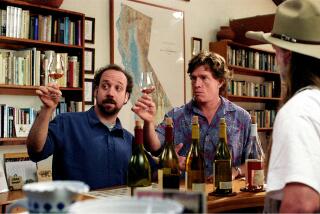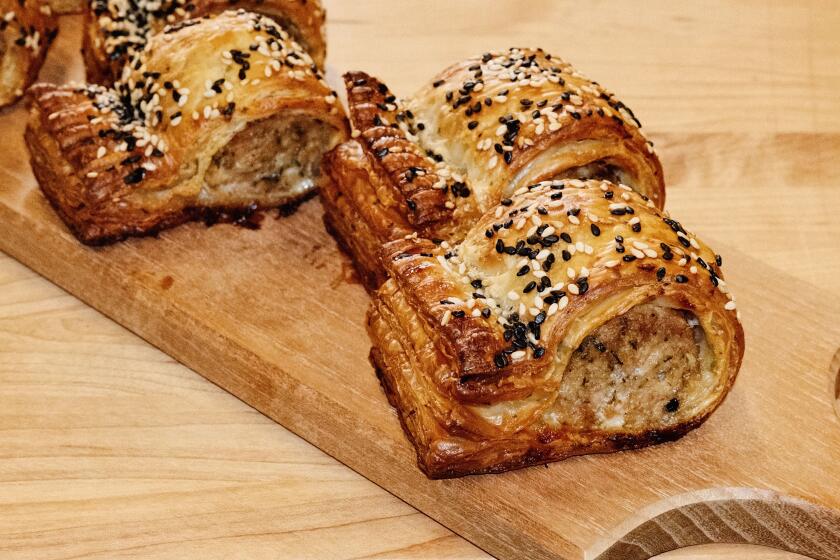Evening Land Vineyards’ eccentric yet grounded vintner
Like most outsiders who get into the wine business, Mark Tarlov, the guiding force behind Evening Land Vineyards, had much to learn about the ins and outs of running a winery. So he surrounded himself with smart people, learned the lessons he needed to learn and then, almost immediately, seemed to forget them.
Instead of one winery, for example, Tarlov now has three, in two states (Oregon and California) and on two continents (the U.S. and France). He makes mostly Pinot Noir and Chardonnay — two very crowded varietal categories — with an ever-increasing number of cuvées, an amount that seems to have more to do with Tarlov’s insatiable curiosity than his business acumen. The end result is one of the more unconventional winery models ever conceived in this country.
Then again, Mark Tarlov isn’t exactly conventional. This is a man who went from writing speeches for Warren Burger to practicing law in Washington, D.C., to producing John Waters films — in other words, a man who has worked with a chief justice and the director of “Pink Flamingos” — suggesting a skill set that’s a bit more elastic than most.
Weirdly enough, this describes his wines as well, which are neither rich nor lean, neither over the top nor understated. If anything, the wines conform to a middle path no matter where they come from; the house style is one of equanimity. This is not to suggest the wines are boring, rather that they possess an evenhanded grace, which made Evening Land’s debut, in 2005, among the more exciting in recent memory.
Evening Land Vineyards produces wine from estate-controlled vineyards in Burgundy and Oregon, and two California appellations, the Santa Rita Hills and the Sonoma Coast. The winery purchases some additional grapes, but all sources can be described as cool-climate sites, for a baseline character of lean, elegant fruit.
The brand has devised a simple price system for its wines that is essentially color-coded, with blue, silver, gold and white labels, a range that includes, on the top end (the white label), some of the country’s most expensive Pinots and Chardonnays (about $120 a bottle) and on the bottom end (the blue label), some of its most affordable for their quality (around $25).
Isabel Meunier makes the wines in Oregon, Christophe Vial in Beaune, France, and Sashi Moorman in California. The legendary Burgundy producer Dominique Lafon, of Domaine des Comtes Lafon, consults for the project — Vial and Meunier, both French, are Lafon’s protégés, lending a distinctive French flair to the proceedings.
“It was supposed to be sort of a retirement project,” says Tarlov, who entered the wine business when presented with a chance to buy Occidental Vineyard, a 5-acre parcel on the Sonoma Coast in 2004. “You know, we’d have a little house, and I’d tend a few grapes into my dotage.” In justifying the purchase to his wife, Tarlov, a native New Yorker, told her that the land cost less than a studio apartment in Manhattan. “How could we not buy it?” he says.
But Tarlov kept hearing about other opportunities to which he couldn’t say no: He seized the chance to lease Seven Springs, one of Oregon’s oldest and most venerable vineyards, then he added a windswept suite of parcels in the western reaches of the Santa Rita Hills near Santa Barbara. Pretty soon he had agreed his way into a fairly complex set of logistics, and over dinner one night with Lafon and another legendary Burgundy producer, Christophe Roumier, things got even more complicated, as the two of them offered assistance to gain entry into the world’s most exclusive vintner’s club, Burgundy. While most of Evening Land’s current production there is centered in the Macon, Chardonnay country, they’ve also been able to secure fruit from Premier Cru and even Grand Cru vineyards in the Côte d’Or, an almost unheard-of feat for an American winery.
After his speechwriting stint with Warren Burger, Tarlov obtained a law degree from Columbia. He made his way down to Washington, D.C., where he served somewhat distractedly as a federal attorney. It was clearly not the best fit. “My aspiration really was to be a storyteller,” he says, “and antitrust litigation was not conducive to too many interesting stories.” For one week out of every three months, however, district litigators were obliged to take up the cases usually reserved for municipal courts. “You got to try street crimes, prostitutes, drug cases, home break-ins, and I was getting a lot of stories out of that.” The inherent drama in these cases inevitably turned Tarlov toward Hollywood.
He landed a job with Warner Bros., where he became adept at the minutiae of finance, eventually starting his own production business. His first project was the adaptation of Stephen King’s “Christine” in 1983. Tarlov and his company, Polar Entertainment, would go on to produce more than a dozen films, including “Copycat,” “Serial Mom” and “Cecil B. Demented.”
Filmmaking took him to exotic places and mundane ones, but they were linked by good restaurants, good wine and, critically, an allowance: Tarlov attributes his love for fine wine to two magic words: “per diem.” He got to know sommeliers Daniel Johnnes and Larry Stone (Stone now serves as his general manager) and restaurateurs Piero Selvaggio in Los Angeles, Danny Meyer in New York and Mark Williamson in Paris. His career as a film producer frequently brought him to their doors and eventually gave him unprecedented entrée into the world of wine.
The defining period may have been his 13-month stint in San Francisco while filming “Copycat.” Tarlov popped into Wolfgang Puck’s Postrio restaurant one evening and ordered dinner and a bottle of wine. The server turned him on to “Cuvée Cathelin,” a rare and pricey Hermitage Syrah from legendary producer Jean-Louis Chave, which Kermit Lynch imported.
Tarlov was so blown away that he came back the next day, and the day after that — for 26 consecutive days, he ordered the same bottle. “Eventually,” says Tarlov, “one night the bartender said, ‘I can’t sell you any more.’ I said, ‘Why not?’ He said, ‘Kermit Lynch says I can’t sell this wine to just one person.’” (Eventually Lynch and Tarlov became friends; Lynch still pesters him to produce a movie based on Lynch’s book “Adventures on the Wine Route.”)
Tarlov’s aesthetic, which drives Evening Land no matter which part of the firmament it’s being drawn from, is clearly derived from these memorable dining experiences and from the lasting friendships with sommeliers that grew out of them — in particular Johnnes and Stone, who are both investors in the company. They were able to convey to him their profound reverence for Burgundy, to appreciate its sensuousness and deceptively nimble strength — and, not least, its tension.
When Tarlov says “Good wine is all about drama,” it seems like a pretty good line told by someone well-versed in good lines. But when he grips the fingers on each hand and pulls them against one another to demonstrate the isometric balance between acid and fruit, when he starts describing the two like a conflict that needs resolving, when he posits how Pinot Noir especially typifies this drama, “because it tricks you, it constantly changes, there’s all this tension between them, and you feel like it’s just going to explode but you don’t know with what,” and when you see the cords of his neck tighten as he tells you this, you realize that it doesn’t really matter whether it’s true or not, you’re inclined to believe him anyway.
“There’s something poetic about all of this that appeals to people who make films,” he says, “because it really is this sort of like trying to make harmony out of dissonance.”
But in the Evening Land wines, this is drama without bombast. Across the board the wines possess a quiet, mannered tension, the tension of jib sails and high wires. They aren’t obvious or ham-handed; they’re nuanced, even ambiguous. In the blue-label wines, that quality translates to charm, wines meant to be consumed in happy gulps; in the higher tiers, with their more demanding textural underpinnings, it is frequently read as a kind of elusive profundity.
It’s not surprising to learn that Tarlov’s favorite director is Billy Wilder, an auteur who was perhaps better at hitting the middle-distance targets than any other filmmaker. “This was a guy who directed some of the greatest movies ever made,” says Tarlov. “And they’re all composed of small movements that when viewed alone are seemingly unimportant — but when viewed as a whole are layered and impactful.”
And that, in his own unorthodox way, is what Tarlov has achieved with his latest production.
More to Read
Eat your way across L.A.
Get our weekly Tasting Notes newsletter for reviews, news and more.
You may occasionally receive promotional content from the Los Angeles Times.










